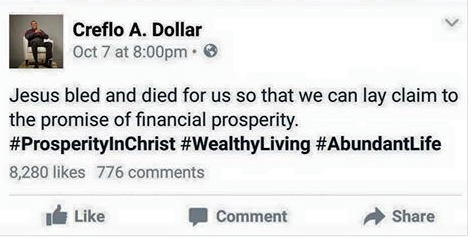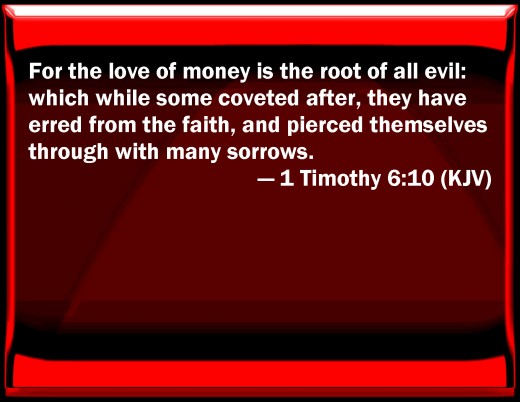The Prosperity Gospel: Is It Scriptural?

Welcome. Today we are going to go over the prosperity gospel most commonly taught on channels like TBN, and which has made people like Kenneth Copeland, Joel Olsteen, and Creflo Dollar both wealthy and famous. This is one of the biggest "gospels" out there. It is a religious belief among some Christians, who hold that financial blessing and physical well-being are always the will of the Almighty for them, and that faith, positive speech, and donations to religious causes will increase one's material wealth. If you have not seen my article on tithing, please read so here. With that being said, let's get into it.
- Reaping What You Sow
- Plans To Prosper You
- What Does Scripture Say?

"Reaping What You Sow"
Christians will often interpret this saying in relations to money. But the problem is that this quote itself is not about money. Let's get this from the scriptures itself. The more correct phrase is you reap what you sow. Where do we find this? 2 Corinthians 9:6. “Whoever sows sparingly will also reap sparingly, and whoever sows generously will also reap generously.”
Galatians 6:7 says we should not be deceived: The Almighty cannot be mocked. A man reaps what he sows. So this saying is scriptural. But what is this really about? It means what you do will come back on to you, monetary or not. It is not just about money. In fact sometimes we get things we do not deserve as a test. The Book of Job is a prime example of that. So when someone is led to believe that only good things are going to happen, once bad things happen this may drive them away from the gospel. That is not exclusively about money. It means if you are being righteous, then the Most High will be for you and get you through anything. Being charitable, kind, patient, things like that and the rest of the laws.
On another note, why focus on money? Are there not other things that are important in this life that you'd hope to get? And even if so, why focus on the reward? If giving the money is a good thing shouldn't that satisfy you enough? Do you give to the homeless and think, "The Almighty is going to give me back 10% more of what I gave", or do you think, "I'm glad I was able to help this poor man eat tonight"?
Plans To Prosper You

He wants us to be happy, successful, prosperous, victorious over any evil circumstances that can pop up unexpectedly, and strong enough to achieve our dreams. That seems like an awful lot to expect from life, and the thought of accomplishing this ourselves is a tall order. But God’s thoughts are favorable toward us. “For I know the thoughts that I think toward you, says the Lord, thoughts of peace and not of evil, to give you a future and a hope” (Jeremiah 29:11, NKJV).
— DISCERNING GOD’S WILL FOR US by Creflo DollarLet's examine the correct context of this chapter. Go to Jeremiah 29 and start from verse one. Notice what is happening at this time. This is during the seventy year captivity in Babylon. Go from verses 1-10. Who is he talking to? The Jews. Why? Because they blasphemed his name and were therefore punished for it. But what does he plan to do once their punishment is up? Take them back home and prosper them in their land. This was not about saying, "If you love God, he will make you richer beyond your wildest dreams." It was just in reference to the covenant.
Now, I'm not against people using these verses as an example of if we repent he will be good to us so long as they recognize the original context and not make it about something else. But as often times as it is used, it is never used in correct context. They make the Almighty out to be a wish granter rather than a sovereign force over all.
What Does Scripture Say?

And he said unto them, Take heed, and beware of covetousness: for a man's life consisteth not in the abundance of the things which he possesseth.
— Luke 12 151 Timothy 6 10 says the love of money is the root of all kinds of evil. Matthew 6 24 says no man can serve two masters because he will hate one and love the other, so we cannot serve God and money.
According to historian Kate Bowler, the prosperity gospel was formed from the intersection of three different ideologies: Pentecostalism, New Thought, and "an American gospel of pragmatism, individualism, and upward mobility." (Bowler, Kate. Blessed: A History of the American Prosperity Gospel. pg 11. Oxford University Press.) During the 1960s prosperity gospel teachers embraced televangelism, giving way to such prominent teachers such as T.D Jakes, Benny Hinn, Creflo Dollar, Kenneth Copeland, the late Billy Graham, and Joseph Prince, all who are included in the world's top 10 richest pastors as of 2018.
Now this is not to say being rich and prospering is a bad thing. In fact Solomon, before his fall from grace, was a very rich man and this was an unasked blessing from the Almighty (1 Kings 3 10-13). But Solomon did not put emphasis on this. Money and prosperity was not the first thing on his mind. That's just a small bonus. He focused on the word and covenant of the Almighty firsthand. That should be everyone's focus. For more info on how much Solomon prospered, please see How RICH was King Solomon?
Thank you for reading. Please check out my article on tithing, because there is a lot of stuff that people do not know about it. Peace and blessings, and all praises to the Most High.








